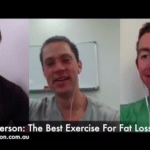//
If you want to increase muscular strength for the demands of your sport, or life in general, then the most beneficial way is to create an anabolic (muscle building) environment. This is accomplished through three key elements: Proper Nutrition, Intense Resistance Exercise, and Adequate Recovery
But aside from achieving a certain muscular look, why should you build muscle? Adding muscle can enhance your ability to perform the activities that you do with more efficiency and less effort. It can also significantly slow the decline of your performance and increase quality of life as you age.
If you are an active person who would like to build more muscle and you’re wondering why you’re not getting the results you’d like, some common factors that often prohibit active people from adding muscle are stress, aging, and improper nutrition.
Stress: High and consistent stress induces a hormonal response that can cause cellular breakdown of our muscle tissue. We often don’t take notice because the stress also increases our body fat storage, which offsets the loss of girth from muscle loss.
Aging: The degenerative process of aging, usually around middle age, suppresses our ability to gain muscle, and requires more effort to maintain what we have as we get older. This is related to the common condition of sarcopenia, which is loss of muscle due to aging, and is a prevalent cause of injury in old age.
Improper Nutrition: Improper nutrition creates an internal imbalance that inhibits muscle growth, and can also put our body in a catabolic state, which is the breakdown of our tissues to create energy. To ensure proper nutrition needed to support optimal muscle growth, here is some specific information below.
Nutrition and Building Muscle
The aging process is inevitable, but with proper nutrition we can slow the rate of our aging, reduce our stress, and provide our muscles with the building blocks to grow. Those building blocks, called amino acids, are derived from the protein that we eat. But not all protein is created equal because one or more of those essential amino acids may be missing, which is called an incomplete protein. This includes almost all vegetables, grains, beans, and fruits. Incomplete proteins can be used together to complement each other in providing all essential amino acids.
However, the downside is that this combination usually results in a higher ratio of carbohydrates, which creates unstable blood sugar and a slew of unwanted hormonal and metabolic responses.
On the other hand, a complete protein supplies all the essential amino acids, and can be found in animal proteins such as eggs, turkey, chicken, fish, and red meat. Two other sources of complete protein are soybeans, and the whole grain called quinoa. Animal proteins do have a higher bioavailability for our body because they have a higher number of nitrogen molecules.
Protein is the only nutrient that contains nitrogen, and the amount can be used as a measurement of the quality of the protein for our body to actually use in the muscle building process.
If you want to find out if you have been getting enough protein in your diet, you can ask your doctor for a Urinary Urea Nitrogen Test to compare the concentration of urea (the nitrogen byproduct of protein metabolism) with the amount of nitrogen intake from our food in the preceding 24-hour period.
If the results find that you are taking in more nitrogen than you are excreting, then you are in a positive nitrogen balance, and are in a good position to generate new muscle cells resulting from your strength-training program. Please note that too high of a ratio of protein in the system can be taxing on your kidneys and may cause unwanted health issues.
When the nitrogen balance is in the negative, then you are in a catabolic state, where you are internally cannibalizing your own tissue for energy. This means that you might need to take in more protein in your daily diet. If there is an equal amount of nitrogen coming in as is leaving, then you are consuming just enough protein to maintain the muscle that you have.
The ideal amount of protein to have in a person’s diet has been a topic of debate among registered dieticians (R.D.) and those in the fitness community for some time. Generally an RD from the medical community might recommend around 15-25 percent of daily caloric intake. Whereas those in the fitness industry who are geared more towards performance, strength, and attaining lower percentages of body fat may recommend 30-40 percent calories from protein to build muscle.
Three steps to eat proper and increase your lean muscle:
1. Eat in each meal a ratio of 30 percent to 40 percent protein, 20 percent to 30 percent Carbohydrates, and 25 percent to 35 percent fat. The proper ratio allows the nutrients to work together in digestion to create stable blood sugar, and maximum absorption of nutrients into the small intestine.
2. Eat every 3-4 hours upon waking to provide that steady stream of nutrients and stable blood sugar through out the day. Muscle building is a feed as it goes process and therefore needs a steady stream of protein through out the day in order to creating an anabolic (muscle building) environment.
3. Incorporate a high quality complete protein in each meal to provide the nine essential amino acids for adding muscle tissue. If you are a vegan, do your best to use complimentary proteins to be complete.(BOB)
Building quality muscle is something that takes the right nutrition program, time, consistency, and hard work in the gym. Genetics also play a significant role, and should be taken into consideration when creating a nutrition program and strength-training program. An average healthy muscle gain can be around 1-2 lbs per month.
Gaining muscle is something that I’ve had to work hard at my entire life due to my genetics, and I understand how challenging it can be, and the amount of patience to achieve great results. Adding muscle is something that I also recommend to most all of my clients who are looking to lose body fat because it will increase their metabolism, and is a key to getting permanent results.
Getting on the right nutrition program and strength training intelligently will be the most effective approaches to gaining muscle. If you’d like help getting the results you want then please contact me
Good luck, and all the best in health and fitness!
If you want to improve your body, add 180 SuperFood to your daily diet.




